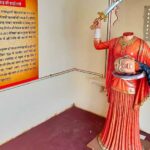Advocate AP Vasavan : Justice Meets Humanity
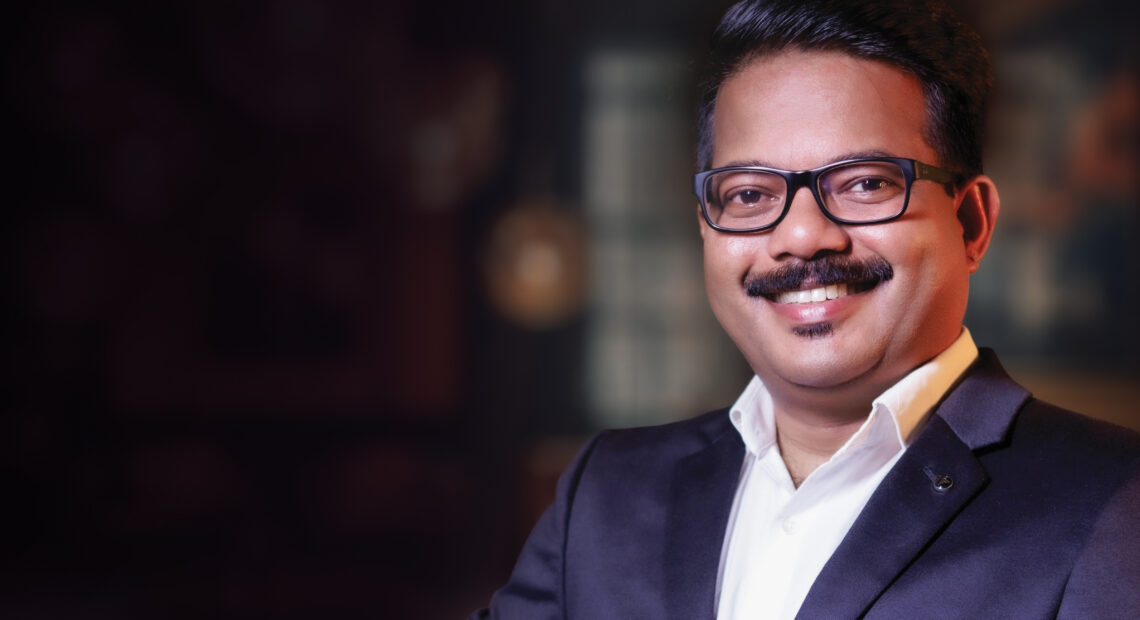
Among the rare class of legal professionals who place humanity, justice and honesty on an equal footing along with law, Advocate AP Vasavan of the High Court of Kerala deserves special mention. During his career spanning 23 years, he has the distinction of having won fair verdicts in several controversial cases. To him goes the credit of handling more than 10,000 cases, including more than 1,000 sessions cases and 14 murder and POCSO cases. The eldest of three children of Prabhakaran and Radha in Palakkal in Thrissur district, Vasavan completed his school and college studies in his home district and then went on to graduate in law from BMS Law College in Bengaluru. He has been practising since 2001. With such a remarkable journey behind him, Advocate AP Vasavan sits down to share insights into his career, philosophy, and the dynamics of the legal system, illuminating the path for future legal practitioners.
Can you share with us a particularly challenging case you handled and how complex was it?
The most complex and challenging cases often involve POCSO (Protection of Children from Sexual Offences). However, the Thrissur POCSO case, which garnered significant attention, is worth a mention. In this case, the defendant’s unwavering belief in his innocence was surprising. Proving innocence in POCSO cases is particularly tough, as these proceedings prioritise the victim’s account. The victim had provided substantial evidence against the accused. However, as the trial unfolded, it was revealed that the victim had implicated the boy to protect someone else. Ultimately, the accused was exonerated, and the court acquitted him unconditionally. This case underscores the principle that with determination, it is possible to unveil the truth and establish innocence.
What reforms are the need of the hour to overhaul the efficiency and effectiveness of the judicial system?
In response to the challenges faced by India’s main legal framework, new statutes are being introduced, signalling significant reforms in the Criminal Procedure Code. Among these are the Bharatiya Nagarik Suraksha Samhita, 2023 (Act No. 46 of 2023), Bharatiya Nyaya Sanhita, 2023 (Act No. 45 of 2023), and Bharatiya Sakshya Adhiniyam, 2023 (Act No. 47 of 2023), which are part of a new criminal law manual. These changes are expected to greatly influence and address existing issues within the legal system. A notable shift towards resolving disputes through mediation, akin to practices in developed countries, is also part of these reforms. Additionally, there’s a consensus on the need for more spacious courtrooms to replace the currently cramped spaces, enhancing the convenience and efficiency of legal proceedings. With the new legal codes coming into effect on April 11, steps towards the digitisation of court activities, including hearings and evidence collection, will commence. It’s anticipated that these advancements will resolve many of the current challenges within the legal system.
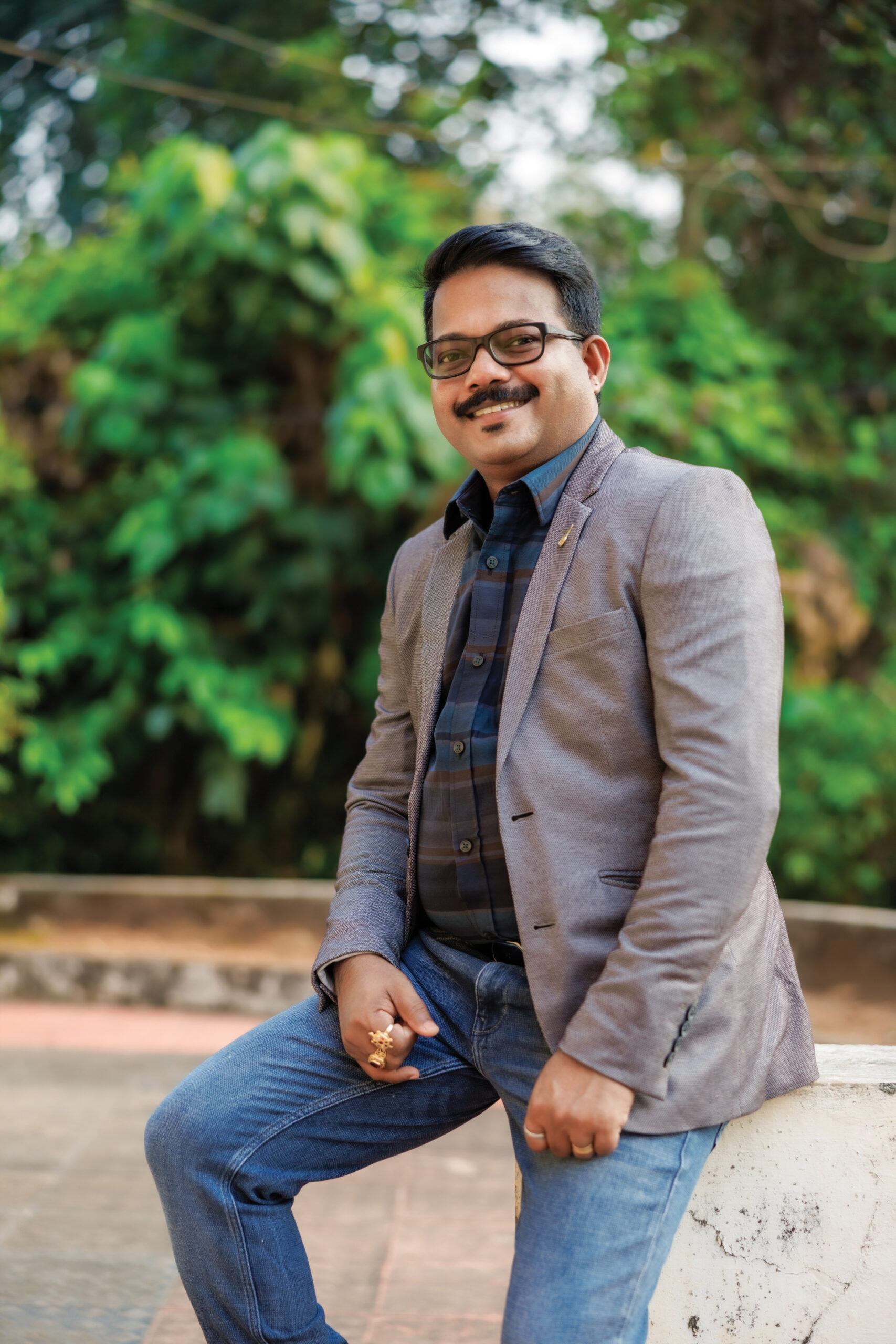
AP Vasavan
Your views on the current state of privacy laws in India and what needs to be done to expand them?
Maintaining privacy within India’s legal framework is a complex challenge, particularly when it involves cases related to women, such as sexual assault and those covered under the POCSO (Protection of Children from Sexual Offences) Act. In such instances, it’s crucial that the victims’ identities and their testimonies remain confidential and are not disclosed to the public. This area has seen vigilant measures being taken. However, the issue of privacy extends into the realm of social media, where the situation is more complex. Adherence to existing regulations could potentially mitigate further privacy concerns. Recent revisions in the Criminal Procedure Code, the Indian Penal Code (IPC), and the Code of Criminal Procedure (CrPC) under the new legal statutes are aimed at addressing these concerns. Nonetheless, a clear understanding of the necessary amendments can only be attained after observing the challenges that emerge following the implementation of these new laws.
Does the legal education system in Kerala need improvement? If so, what are they?
Restructuring the legal education system exclusively within Kerala is not a feasible approach, given that laws are uniform across India and not specific to any single state. Historically, Kerala’s educational landscape faced a significant gap due to the absence of private legal education institutions. However, this gap has been bridged with the entry of private sector institutions. Nowadays, students have the liberty to select their preferred institutions for legal studies.
Despite these advancements, the legal education system still exhibits numerous deficiencies. For someone embarking on a career in law, understanding the workings of a court goes beyond just theoretical knowledge; it requires practical insight into current procedures and practices. Like other professional courses that balance theoretical and practical learning, legal studies should also emphasise practical experience.
Considering India’s extensive legal framework spread across more than 3000 Acts, it’s unrealistic to expect a law student to master them entirely. Therefore, the modern educational framework should focus on imparting knowledge of critical laws and practical skills for navigating legal challenges. Although my own legal education lacked a strong emphasis on practical application, there has been a noticeable shift towards incorporating practical elements into the curriculum. Including more hands-on learning and practical training within legal studies would be a beneficial advancement.
What qualities do you think a good lawyer should have?
To excel, a lawyer needs several key qualities. Firstly, a deep and thorough understanding of the law is crucial, along with staying informed about the latest judgments from the High Court and Supreme Court, as well as any updates to the law. Secondly, integrity and unwavering honesty towards clients are non-negotiable virtues. Thirdly, a diligent approach to case preparation is required, which includes conducting thorough research and consulting experts on complex legal questions. A concerning trend observed in recent times is the prioritization of financial gain. However, based on my twenty-three years in the legal field, I advocate for a commitment to honesty and diligence in one’s practice, as financial success naturally follows professional integrity. By focusing on these principles, issues like corruption and favouritism can be significantly minimised. Additionally, ensuring that legal proceedings are conducted in public rather than in private spaces can further uphold the principles of transparency and fairness.
Can you elaborate on the merits and implications of a precedent recently adopted by the Kerala High Court that impressed you?
A notable ruling by the Honorable Kerala High Court involved a case where a father accused the mother of sexually abusing their child. In this case, while considering the mother’s plea for bail, Judge Shircy not only granted bail but also issued a specific order for a special team to conduct the investigation. Under the judge’s directive for the High Court to oversee the process, the investigation ultimately revealed the mother’s innocence and exposed the father’s fabricated allegations. This case highlights the misuse of the POCSO Act, demonstrating that it is possible to uncover the truth behind false accusations. It also ensures that those who make such unfounded claims are held legally accountable. Furthermore, the High Court has actively engaged in various public matters, illustrating its role in addressing significant issues. However, this raises questions about the extent to which judicial intervention in certain affairs is appropriate.
Won’t the public lose respect and fear for the legal system when criminals like Govindachami use the loopholes of the law to enjoy a life of comfort in jail? Should the Indian legal system be reformed in this context?
In the case of Govindachami, the Supreme Court’s decision to commute his death sentence to a lesser punishment represents an instance of legal mercy. Observations about his transformation during his time in prison have sparked discussions, though it’s essential to remember that the legal system is designed to ensure that severe crimes receive appropriate sanctions. Based on my experience, India’s legal framework is among the most precise globally, and it’s poised to improve further with ongoing reforms.
The guiding principle of our judiciary is to prevent the wrongful punishment of the innocent, even at the risk of the guilty going unpunished, a doctrine that is recognised and upheld internationally. It’s inaccurate to claim that the Indian legal system has inherent flaws; rather, like any system, it’s subject to improvements. Originating from British legal practices, India’s legal system has served well for centuries. Yet it requires updates to address contemporary challenges. The introduction of new legal reforms promises to enhance its effectiveness and fairness.
Are there current events or situations causing the public to question the fairness of the legal system?
We often find that our perceptions of legal outcomes are influenced primarily by media reports, which may not provide a complete or accurate picture of the case. For instance, consider the case involving actor Dileep. My understanding of the details surpasses what has been broadly reported by the media, suggesting that the reasons for his arrest and continued detention might not align with the wider narrative presented in the news. This discrepancy highlights the divergence between public perception and the actual facts.
Another example is the Highrich case, currently attracting media attention. Reports suggest Highrich defrauded people of Rs 1,200 crores, with Rs 600 crore frozen in accounts. However, a closer look reveals that not a single complaint has been lodged by any client. The allegations stem from a retired police officer with no direct ties to the company, illustrating how media-driven scandals can distort public perception.
This trend of scandalisation by the press is further exemplified by the case involving a bishop accused of rape. Upon reviewing the case file and summary judgment, it’s clear that the details reported in the media did not accurately reflect the proceedings or the outcome, which concluded the bishop was innocent.
These examples underscore the necessity of basing legal judgments on the specifics of each case, rather than being swayed by media representations, which may not always convey the truth.
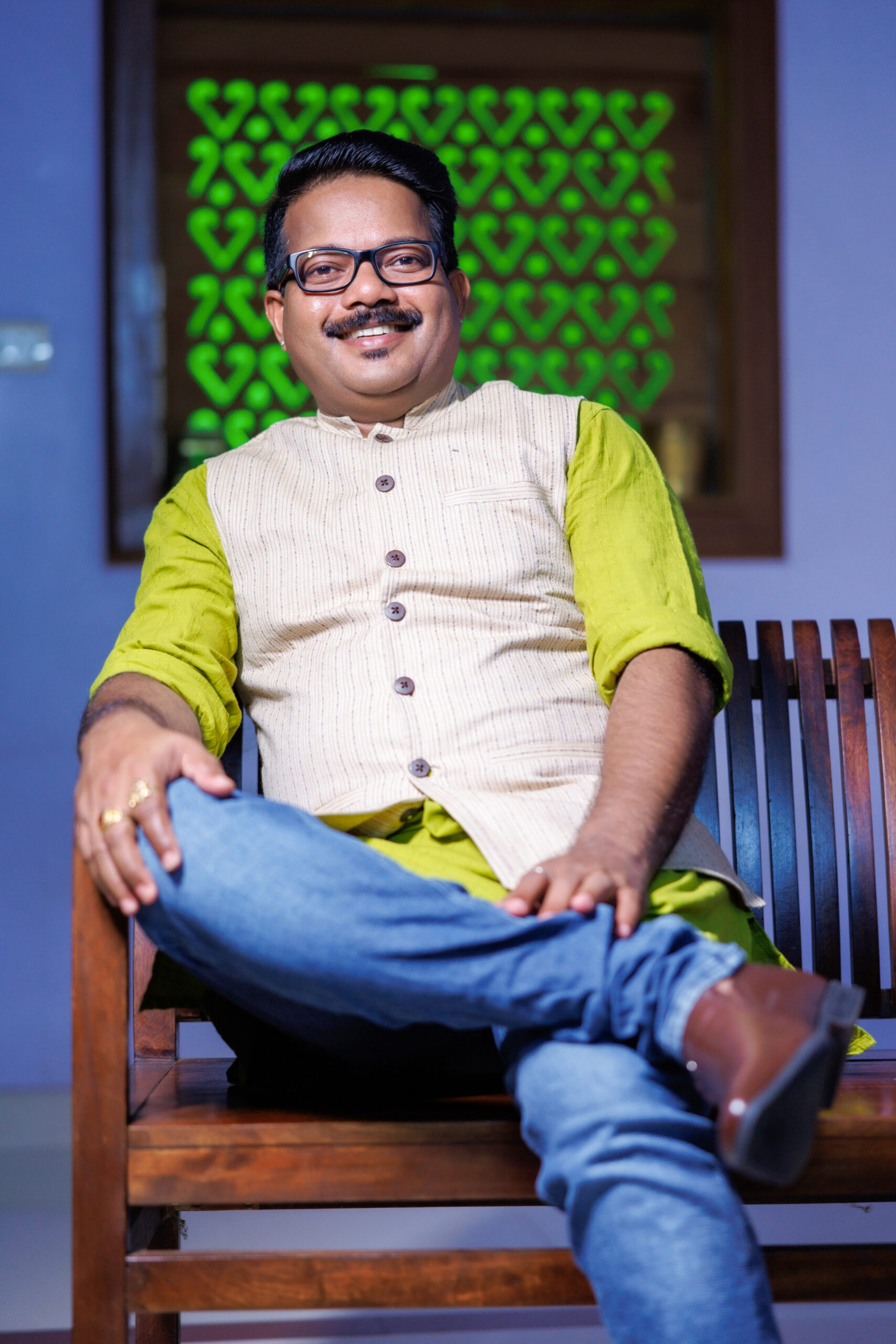
AP Vasavan
What steps should be taken to avoid delay in cases?
One significant challenge within our legal system is the protracted duration of case resolutions. A key solution to this issue is the reform of the legal framework. Upcoming reforms in criminal law alongside advancements in civil law, aim to address this. Initiatives to expedite the handling of cases involving non-residents are already underway. Expanding Lok Adalats and Mediation Centers is a strategy I believe should be pursued more aggressively. With the introduction of the new legislation, disputes between individuals can be resolved through arbitration by a mutually agreed upon arbitrator, or, if necessary, by a legally recognised mediator or a government-appointed arbitrator. This approach could potentially halve the caseload in courts, as it encourages resolution before escalating to a court setting.
Concerning the pace of legal proceedings, the current system mandates the submission of a counterclaim within 30 days of filing a suit, a timeline that seems reasonable for organising case documents. In comparison, responses to RTI requests alone can take over 30 days, illustrating the logistical and technical complexities involved in expediting case resolutions. Additionally, it’s impractical to proceed with a case without addressing preliminary motions and gathering evidence, which also contributes to delays.
It’s important to acknowledge the rights of all parties involved in a legal matter. For instance, an accused individual might only become aware of charges against them upon receiving a notice. It’s vital that they have the opportunity to defend themselves. A hasty judgment could deprive the defendant of the chance to present their case, necessitating time for the preparation and submission of relevant documents. Currently, the delays do not seem to stem from intentional stalling. To accommodate the growing need for legal adjudication, a slight increase in the number of courts, alongside a boost in Dispute Resolution Centers and Adalats, could lead to a reduction in the backlog of cases.
Can you elaborate on the interventions of the Kerala High Court in shaping social norms and solving contemporary social problems?
The Kerala High Court has shown remarkable responsiveness to pressing social issues, swiftly intervening in matters that impact the public directly. Its proactive stance has been evident in addressing concerns such as the use of air horns in vehicles, the failure to dim headlights at night, the obstruction of movement due to oversized arches on roads, and the lack of drainage systems to prevent waterlogging. Additionally, the court has taken decisive action in instances of political violence and murders, as highlighted in cases such as the assassination of TP Chandrasekaran. This demonstrates a firm approach to curbing such incidents through its rulings. Beyond political matters, the court has also been vocal against the imposition of undue taxes on the public by the government. The Kerala High Court’s readiness to base its interventions on newspaper reports and engage with issues beyond the courtroom showcases its commitment to addressing societal concerns, illustrating a broader perspective on justice that extends to the dynamics of the community it serves.
As a senior lawyer, what advice can you give to young lawyers to uphold professional ethics?
As a seasoned lawyer, I have two pieces of advice for newcomers to the legal profession. First, it is crucial to master the fundamental rules of law, including the Evidence Act, IPC, CrPC, CPC, and Civil Rules of Practice. Regular updating of these statutes is essential to stay current. Secondly, aspiring lawyers should diligently observe court proceedings, ensuring accurate comprehension and appropriate action. Maintaining absolute honesty and integrity when dealing with clients is paramount along with having a mindset that regards them with utmost respect and reverence.
How do you balance your busy professional schedule and personal life?
I once had the fortune to encounter Ayyappan Pillai Sir, a highly respected senior lawyer, who shared a piece of advice that significantly improved my ability to balance my hectic professional and personal life. This advice came around the time mobile phones were becoming ubiquitous. He suggested that I should turn off my mobile phone from 9 PM to 9 AM, dedicating the time after 9 PM until bedtime, and the early hours until 9 AM exclusively to my family. He emphasized that the pursuit of wealth and recognition should not come at the cost of our relationships with our children. Failing to be present in their lives renders all other achievements meaningless. Taking this guidance to heart, I am committed to spending the early mornings with my children, helping them prepare for school, which has fostered a deep bond and affection between us.
I relayed this wisdom to a judge involved in a particularly demanding case, revealing that I am a father of four. To my surprise, in open court, he acknowledged me as his mentor, crediting me with providing a mantra that effectively enriched his family life. To this day, my family joins me on trips that are not work-related. However, I maintain a strict boundary: I neither invite my partners to my home nor allow my family life to intrude into my professional responsibilities.
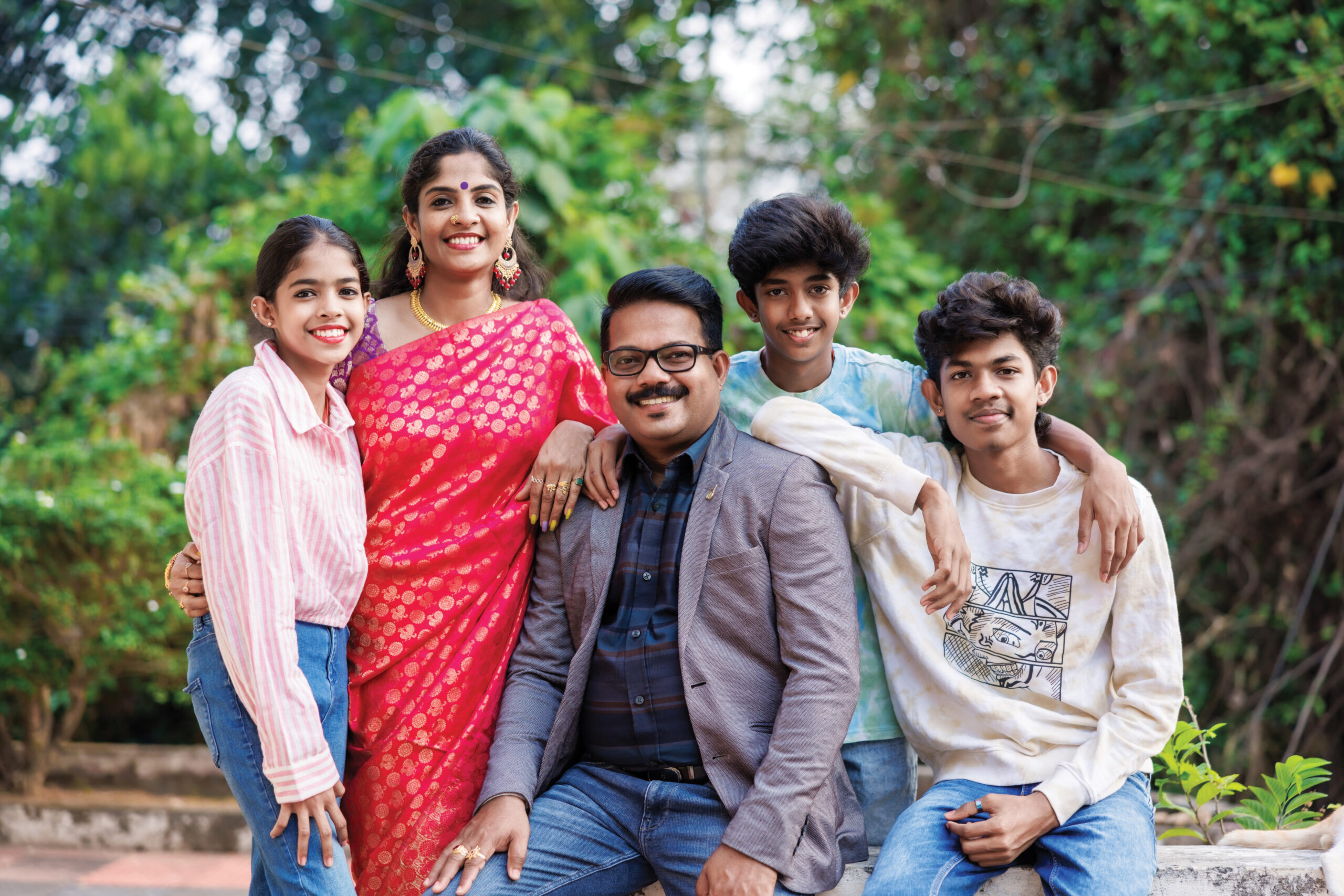
AP Vasavan & Family
What is the secret behind your success?
My success can largely be attributed to the solid foundation of my family, with my wife, Advocate Prasara Vasavan, standing as a pillar of strength in both my personal and professional endeavours. Prasara is not only accomplished in the legal field but is also an exceptional athlete. She shone brightly in the women’s IPL cricket as one of the top players and recently triumphed in the lawyers’ women’s shuttle tournament, showcasing her sporting talent. In addition to her legal and athletic achievements, Prasara has ventured into modelling, having worked as a customer model for Bhima Jewellery and Toni and Guy, among others. She is also a talented painter and possesses a remarkable voice. We are blessed with three children: Vedit, Sahasr, and Devanshi.
What motivated you to enter the legal field?
The aspiration to pursue a career in law was instilled in me from a young age, largely influenced by my father. Over time, this initial interest evolved into a profound passion. Before securing employment in a bank, my father was employed in a legal office, and it was his dream that his eldest son enter the legal profession. This deep-rooted desire of my father guided me towards choosing a path in law.






